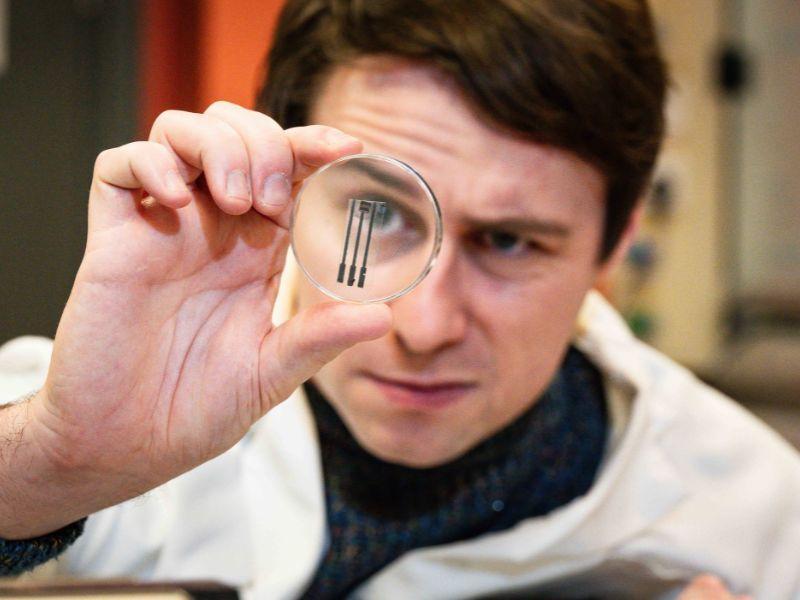

DCU research team successfully test new diagnostic nanotechnology at scale
Quick and accurate diagnosis of health problems is a core pillar of modern medicine. At the foundation of that pillar lies biosensor technology. This breakthrough, originally published on nature.com, could be one of the first steps on a new path for biosensor manufacturing. These devices could be made cheap, plentiful, and readily available to all without the negative environmental impact of current manufacturing methods.
The team tested a new production process which involves using a laser to blast a piece of gold within a liquid medium to produce the nanoparticles which are then used to manufacture the sensors. This newly developed alternative to wet chemical methods for gold nanoparticle production uses less toxic chemical agents and provides a more sustainable production route. Using the sensor, the team successfully detected a biomarker molecule present in the blood of patients which is indicative of cancer.
This form of testing is not currently viable due to the cost of biosensor manufacturing. There is a body of research suggesting this molecule could be used to identify aggressive cancers early, which would improve treatment outcomes significantly due to earlier detection.

In the media:
Irish tech and science news outlet Silicon Republic covered the team's successful testing of this new nanoparticle production method.
In addition, the team ran a trial production run in which they were able to create over 200 of these sensors in only a few hours at the low cost of just a few cents per sensor. The manufacturing process was designed to be easily automated, meaning that this process could easily be brought to factory scale.
Over the past few decades, the blossoming science of nanotechnology and the definition of new material forms has allowed manufacturers to make better biosensors, but usually at higher cost. This latest innovation points to a more sustainable and accessible era of biosensor diagnostic technology.
Dr Cian Hughes, Dr Sithara Sreenilayam and Prof Dermot Brabazaon collaborated on this project within the Advanced Processing Technology Research Centre at DCU. All three are members of the SGI I-Form centre for Advanced Manufacturing.
Dr Cian Hughes said:
“Within the field of nanotechnology generally, researchers have learned to take dangerous materials, the use of which was once considered impossible, and incorporate them into devices which save countless lives. These sci-fi-like materials and processes have all been brought together to create small trinkets that glow or spark to tell us everything we need to know about the inner workings of the human organism. It is nothing short of a miracle that it has been possible to create such devices, and that is the problem: miracles aren’t sustainable. We hope this project can point the way to more sustainable production of biosensors.”
Prof Dermot Brabazon said:
“It is exciting to see how the latest manufacturing and materials discoveries can be combined to provide a better diagnostic tool which could help in the early detection and monitoring of various forms of cancer. To get to this point has taken more than five years building on the research of many previous studies. I am grateful for the funding from SFI and the great work of the researchers involved without which this positive outcome would not have been possible.”
Dr Sithara Sreenilayam said:
“This study introduces an innovative and eco-friendly approach for cost-effective production of biosensors. Preliminary tests on manually produced sensors have shown their effectiveness in early cancer detection, implying the potential for a reliably mass-produced version to represent a significant stride in affordable and environmentally conscious biosensor technology. Breakthroughs in mass biosensor production are crucial for enhancing overall quality of life, particularly in ensuring swift and accessible diagnoses for effective treatment of cancer and various other diseases.”
